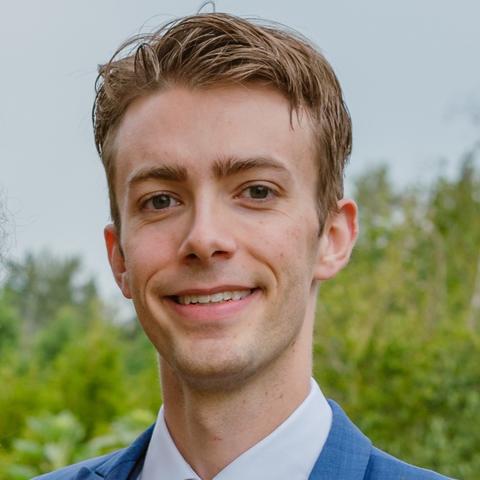Section Branding
Header Content
New walking tour in Savannah explores medical history of Georgia's oldest city
Primary Content
Matt Schafer's pandemic passion project is a bit different than most people's.
When he's not on shift as a cardiac catheterization laboratory nurse in Savannah, there's a good chance he's brushing up on the city's medical history — not just to satisfy his own curiosity, but that of anyone with a ticket for Savannah Medical History Tours.
In a city as old as Savannah, founded in 1733, there's no shortage of historical tours: About 480 tour guides were registered with the city government in 2021. But Schafer's tours, which he began leading in August, are a bit off the beaten path.
“And so we're just going to start off our tour here, in front of the old Telfair Women's Hospital,” Schafer said to a group of five people gathered on a Saturday morning just across the street from the city's famed Forsyth Park.
“They, to their credit, gave their services to both the Black and white population in Savannah, at a time when that was not generally the rule,” Schafer said of Georgia's first hospital established exclusively for women.
The building is now an assisted living facility for senior citizens and people with disabilities. But the facade still bears the Telfair Women's Hospital name, even though it hasn't seen any patients in over 40 years.
While this first stop on the tour pretty clearly has a medical backstory, the others are a bit more beneath the surface.
One example is Congregation Mickve Israel, two blocks north of Forsyth Park. One of its earliest members was Samuel Nunez, a Portuguese-Jewish doctor who Schafer said was instrumental in helping Savannah get through its first epidemic, of which there have been several, including outbreaks of yellow fever.
“He went around doing radical treatments at the time: Let's treat the fever and put wet rags in their armpits to cool them down,” Schafer said. “And he also appears to have started Savannah's first public hygiene to make sure that mosquitoes maybe couldn't grow everywhere in the city.”
What makes Nunez's story even more remarkable is the fact that Jews were initially banned from entering Georgia in its earliest days as a British colony.
“We literally owe our city to the fact that people ignored that antisemitism and came anyways,” Schafer said.
So, who typically goes on these tours? Most guests, Schafer said, are out-of-town medical professionals. But some are just local history buffs who live in town, like Robert Trithart.
“I've been on ghost tours and I've been to tour the historic houses,” Trithart said. "I don't know anything about the [medical history of] Savannah."
Most of the stops on the tour are in Savannah's Historic District, but Schafer makes sure to touch on other aspects of the city's medical history that are a bit outside walking distance.
Take the building that used to house the Georgia Infirmary, about a mile south of the Historic District. It was one of the first nursing schools in the nation to teach African Americans. Schafer also brings up the infirmary because it's easy to overlook its true origin.
“It started off in a really atrocious way,” Schafer said. “If you think about it in an allegory, it would be the hospital in Auschwitz. It was not a very good place. It was a hospital exclusively funded and staffed by white people who took care of the enslaved population because they wanted to protect their investment.”
The commemorative plaque outside makes no mention of slavery. The closest it comes is wording from the original charter of the infirmary: “for the relief and protection of afflicted and aged Africans.”
Sue Yacker-Frischer, one of the tour guests, always found that phrase misleading. A former Medicare and Medicaid case manager, she used to work at the building, which later became a facility for stroke patients.
“Medical history shapes so much, and we don't really talk about it,” Yacker-Frischer said. “I feel like it's important, too — especially now with the pandemic and how that's sort of shaping things. And somebody 50 years from now will be talking about how COVID shaped the city.”
For Schafer, looking to the past became a way to cope with the harsh reality of the present.
“There's been moments of just sheer bleakness for the entire nursing profession in the last two years,” said Schafer, whose family includes five other nurses, with a sixth member in nursing school.
“I'm a big planner," he said. "I'm always looking forward to next vacations. And I lost that during the pandemic.”
While quarantining at home during the early days of the pandemic, Schafer made the most of his alone time, diving into obscure books and drawing up a business plan.
“It became the project I could use to kind of focus on knowing there'd be better days at the end of this,” he said.


